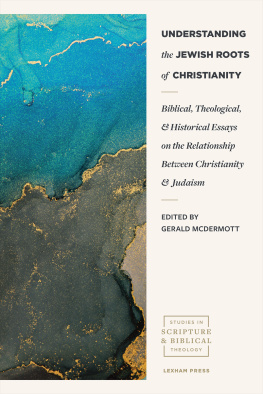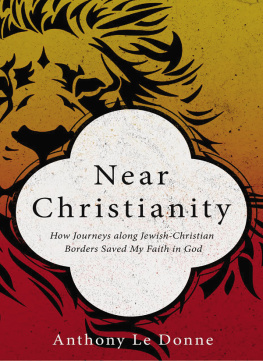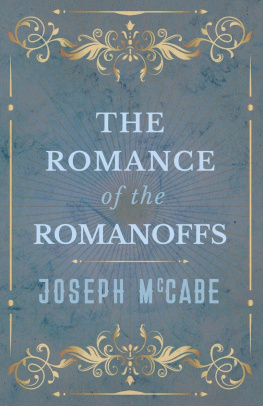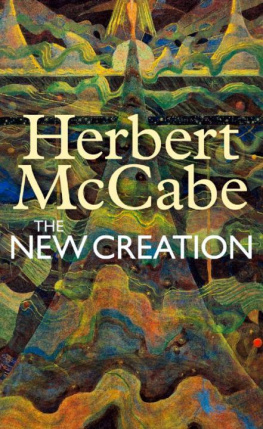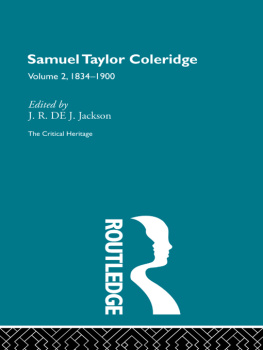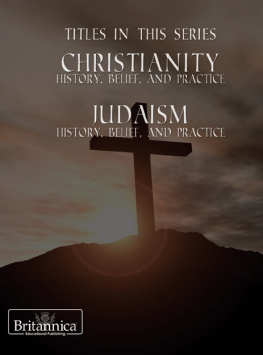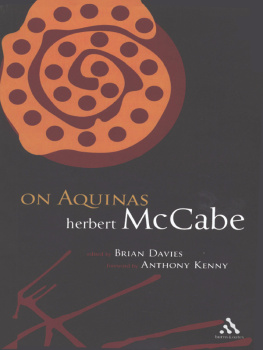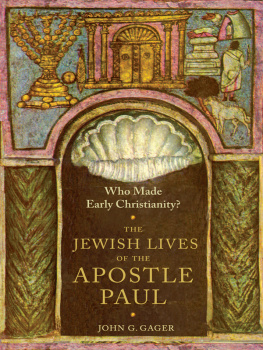Matt Jackson-McCabe - Jewish Christianity
Here you can read online Matt Jackson-McCabe - Jewish Christianity full text of the book (entire story) in english for free. Download pdf and epub, get meaning, cover and reviews about this ebook. year: 2019, publisher: Yale University Press, genre: Religion. Description of the work, (preface) as well as reviews are available. Best literature library LitArk.com created for fans of good reading and offers a wide selection of genres:
Romance novel
Science fiction
Adventure
Detective
Science
History
Home and family
Prose
Art
Politics
Computer
Non-fiction
Religion
Business
Children
Humor
Choose a favorite category and find really read worthwhile books. Enjoy immersion in the world of imagination, feel the emotions of the characters or learn something new for yourself, make an fascinating discovery.

- Book:Jewish Christianity
- Author:
- Publisher:Yale University Press
- Genre:
- Year:2019
- Rating:4 / 5
- Favourites:Add to favourites
- Your mark:
- 80
- 1
- 2
- 3
- 4
- 5
Jewish Christianity: summary, description and annotation
We offer to read an annotation, description, summary or preface (depends on what the author of the book "Jewish Christianity" wrote himself). If you haven't found the necessary information about the book — write in the comments, we will try to find it.
Jewish Christianity — read online for free the complete book (whole text) full work
Below is the text of the book, divided by pages. System saving the place of the last page read, allows you to conveniently read the book "Jewish Christianity" online for free, without having to search again every time where you left off. Put a bookmark, and you can go to the page where you finished reading at any time.
Font size:
Interval:
Bookmark:
Jewish Christianity
THE ANCHOR YALE BIBLE REFERENCE LIBRARY is a project of international and interfaith scope in which Protestant, Catholic, and Jewish scholars from many countries contribute individual volumes. The project is not sponsored by any ecclesiastical organization and is not intended to reflect any particular theological doctrine.
The series is committed to producing volumes in the tradition established half a century ago by the founders of the Anchor Bible, William Foxwell Albright and David Noel Freedman. It aims to present the best contemporary scholarship in a way that is accessible not only to scholars but also to the educated nonspecialist. It is committed to work of sound philological and historical scholarship, supplemented by insight from modern methods, such as sociological and literary criticism.
John J. Collins
General Editor
THE ANCHOR YALE BIBLE REFERENCE LIBRARY
Jewish Christianity
The Making of the Christianity-Judaism Divide
MATT JACKSON-McCABE
YALE UNIVERSITY PRESS
NEW HAVEN AND LONDON
Anchor Yale Bible and the Anchor Yale logo are registered trademarks of Yale University.
Copyright 2020 by Yale University.
All rights reserved.
This book may not be reproduced, in whole or in part, including illustrations, in any form (beyond that copying permitted by Sections 107 and 108 of the U.S.
Copyright Law and except by reviewers for the public press), without written permission from the publishers.
Yale University Press books may be purchased in quantity for educational, business, or promotional use. For information, please e-mail (U.K. office).
Set in Adobe Caslon type by Newgen North America, Austin, Texas.
Printed in the United States of America.
Library of Congress Control Number: 2019952803
ISBN 978-0-300-18013-8 (hardcover : alk. paper)
A catalogue record for this book is available from the British Library.
This paper meets the requirements of ANSI/NISO Z39.48-1992 (Permanence of Paper).
10 9 8 7 6 5 4 3 2 1
For friends and teachers from my Chicago days and, as always, for my family.
For the distinction between Christians and other men is neither in country nor language nor customs... This teaching of theirs has not been discovered by the intellect or thought of busy men, nor are they advocates of any human doctrine as some men are.
Epistle to Diognetus 5.13
Is there a Platonic Idea of Christianity hovering somewhere in the ontosphere?
Daniel Boyarin, Rethinking Jewish Christianity
The Christian faith did not exist in the beginning. In the beginning there existed merely the heretical Jew, Jesus of Nazareth.
Hans Dieter Betz, Orthodoxy and Heresy in Primitive Christianity
Contents
Acknowledgments
This is a project I have been sneaking up on in some sense ever since I was a graduate student at the University of Chicago in the 1990s. What eventually became a dissertation, Logos and Law in the Letter of James, was initially supposed to have been only one section of one chapter of a study arguing that the Letter of James was better interpreted as an expression of early Judaismalbeit one with great interest in a messiah, Jesusthan as a Jewish Christianity. My intention was to use James as a sort of case study in the problem of the category Jewish Christianity. Disentangling the complex exegetical issues surrounding James, however, became a job in itself. I continued thinking about the larger problem, though, and eventually came back around to it some years later in an edited volume called Jewish Christianity Reconsidered. I was shockedthough also intriguedto find my work there interpreted in some quarters as a defense of the category. I continued to dig more deeply into where this notion of Jewish Christianity came from, how it became so embedded in the scholarly imagination, and how our understanding of Jewish and Christian antiquity might look different without it.
Some of the published results of those efforts have been incorporated in one way or another into the present study. An essay published under the title The Invention of Jewish Christianity in Johns Tolands Nazarenus in The Rediscovery of Jewish Christianity: From Toland to Baur (ed. F. Stanley Jones; Society of Biblical Literature, 2012) has been revised and integrated into draw freely on an essay titled Ebionites and Nazoraeans: Christians or Jews? that I wrote at the invitation of Hershel Shanks for a volume called Partings: How Judaism and Christianity Became Two (Biblical Archaeology Society, 2013). I am grateful to the publishers of these works for their permission to use this material here.
When John Collins asked whether I would be interested in producing a volume on Jewish Christianity for the Anchor Yale Bible Reference Library, I jumped at the chance to work through the issues more systematically. I am exceedingly grateful to him for the invitationand for not balking when I came back with a proposal that was more critical history of a modern interpretive construct than analysis of an ancient phenomenon. I also owe him tremendous thanks for his patience as I wrote it, and for shepherding the whole project from start to finish. The anonymous reviewers of the initial proposal were invaluable in pushing me both conceptually and at the level of detail as I was first thinking through the project. The anonymous reviewers of the full manuscript likewise gave immensely important feedback that resulted, I hope, in a clearer, stronger argument. I am deeply grateful to them and to the books editor, John Kloppenborg, for their exacting and insightful readings of the manuscript. It goes without saying that all remaining errors and problems are my responsibility alone.
Everyone at Yale University Press has been a pleasure to work with, including Jennifer Banks, Piyali Bhattacharya, Eric Brandt, Whitney Schumacher, and Ann-Marie Imbornoni. Susan Laity provided a number of helpful suggestions that led to an improved manuscript. I am especially indebted to Jessie Dolch for her expert copyediting, and to Katherine Ulrich for her careful indexing. Above all, I cannot thank Heather Gold enough for giving me the time and space I needed to follow the project where it led me, and for reliably wise counsel at many critical junctures along the way.
It goes without saying that I owe a great debt to many scholars, past and present, named and unnamed, who have explored the same or related problems before me. By its nature, this study engages extensively in a critical analysis (of some, at least) of their work. I have undertaken this with no small trepidation. Doing my best to understand other peoples writings, ancient and modern alike, I have found evidence time and again of intellects far more capacious than mine; of philological abilities and sheer breadths of knowledge surpassing anything I will ever hope to accomplish. I have spent considerable time, for example, with the writings of F. C. Baur. The more I read him, and read about him, the more I marvel. The same goes for any number of the other authors treated in these pages, including not least those contemporary scholars with whom I engage extensively in later parts of the book. A special word of thanks goes to Annette Yoshiko Reed for generously sharing with me the page proofs of her outstanding collection Jewish-Christianity and the History of Judaism, which made it possible for me to account for it in . I have learned a great deal from her, as well as from F. Stanley Jones, Petri Luomanen, Daniel Boyarin, Edwin Broadhead, and the many other contributors to the Society of Biblical Literatures Jewish Christianity/Christian Judaism section. A number of the ideas published here were first presented to this group, and I have benefited greatly from the constructive criticism I received there. I hope I have done justice to these and other writers in my attempt to engage critically, in turn, with their work.
Next pageFont size:
Interval:
Bookmark:
Similar books «Jewish Christianity»
Look at similar books to Jewish Christianity. We have selected literature similar in name and meaning in the hope of providing readers with more options to find new, interesting, not yet read works.
Discussion, reviews of the book Jewish Christianity and just readers' own opinions. Leave your comments, write what you think about the work, its meaning or the main characters. Specify what exactly you liked and what you didn't like, and why you think so.

